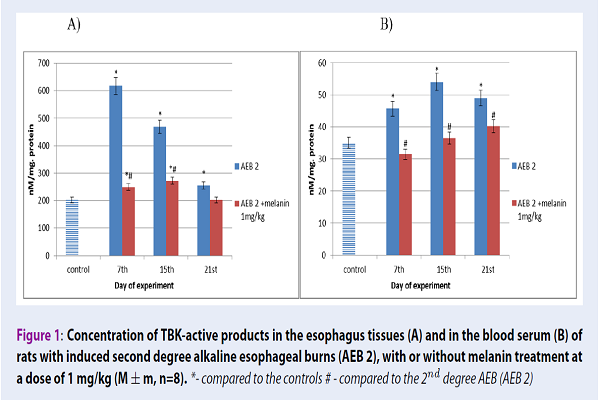Protective antioxidant effect of melanin against chemical burn-induced esophageal injury
DOI:
https://doi.org/10.15419/bmrat.v5i10.484Keywords:
Burn the esophagus, Melanin, Oxidative stressAbstract
Background: Oxidative stress is the main cause of mortality in chemical burn-induced esophageal injury. Melanin, a natural antioxidant compound from yeast-like fungus Nadsoniella nigra strain X- 1, has been shown to decrease the content of lipid peroxidation products after burn. The aim of this study was to investigate the protective effect of melanin in the treatment of esophageal injury after a chemical burn.
Methods: A alkali burn model was used to induce injury to the esophagus in immature rats. Changes in the levels of malondialdehyde, secondary products of lipid peroxidation (thiobarbituric acid reactive substances), superoxidase dismutase, and catalase in the blood, as well as changes in the esophagus tissue, were examined.
Results: Melanin decreased the content of lipid peroxidation products following burn injury. Melanin increased the activity of superoxidase dismutase and reduced the activity of catalase, as well as reduced esophagus oxidative injury in our chemical burn model.
Conclusion: Melanin treatment may protect against chemical burninduced esophageal injury, possibly by inhibiting burn-induced oxidative stress.

Downloads
Published
Issue
Section
License
Copyright The Author(s) 2017. This article is published with open access by BioMedPress. This article is distributed under the terms of the Creative Commons Attribution License (CC-BY 4.0) which permits any use, distribution, and reproduction in any medium, provided the original author(s) and the source are credited.
